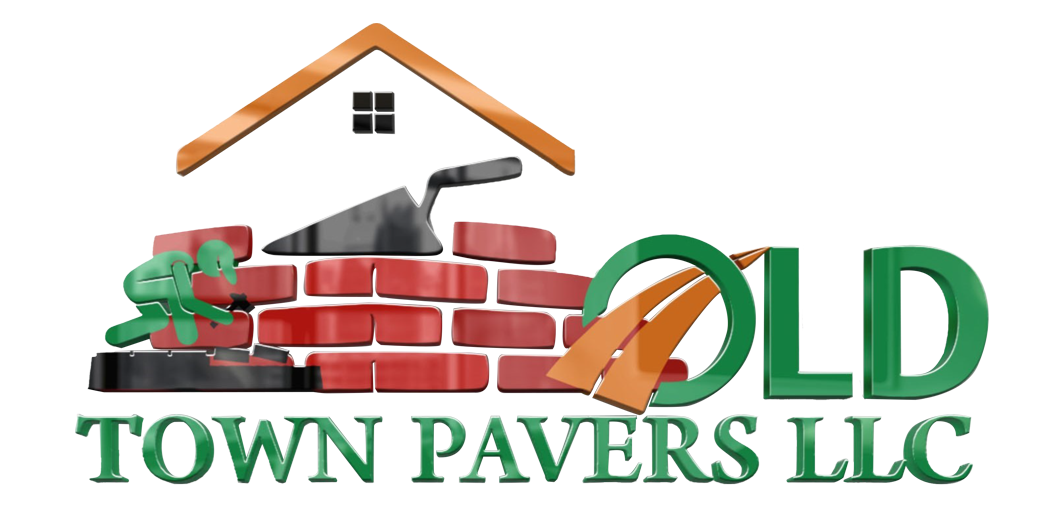Understanding Permeable Pavers
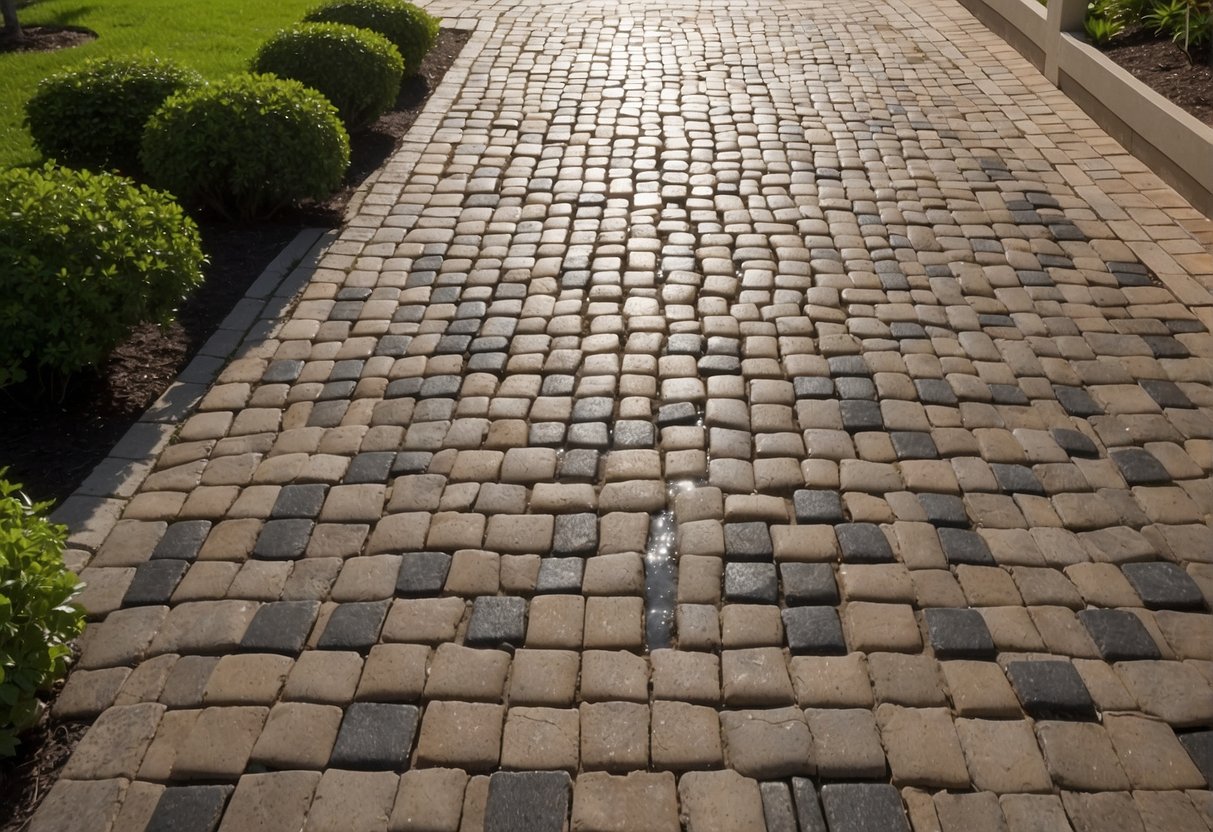
Permeable pavers offer an environmentally friendly solution for effective stormwater management in urban settings, especially relevant in areas like Fort Myers where drainage is crucial. We’ll examine their design principles and compare them to traditional paving options.
Basics of Permeable Pavers
We know permeable pavers as a specific type of paver designed to allow water to pass through the surface and into the ground below. They consist of a variety of materials such as concrete, stone, brick, plastic, and occasionally asphalt. Unlike traditional solid paving materials, these pavers usually have gaps filled with fine gravel or a similar aggregate that filters water down through the surface.
- Materials: Concrete, stone, brick, gravel, plastic
- Function: Facilitate water drainage through gaps
The structure of permeable pavers is composed of several layers. At the top, we see the actual pavers, followed by a layer of fine aggregate, then a base layer of larger crushed stone, and finally, a soil filtration layer. This layered system ensures that stormwater is managed effectively, reducing runoff and preventing flooding.
Comparison with Traditional Pavers
When comparing permeable pavers to traditional pavers—often made from solid materials like non-porous concrete or clay brick—we notice distinct differences. Traditional pavers direct water to drainage systems or create runoff, potentially leading to erosion or strain on sewer systems during heavy rains.
- Water Management: Traditional pavers redirect; permeable pavers absorb and filter.
- Environmental Impact: Permeable pavers better support groundwater recharge and reduce runoff-related issues.
We recognize that while traditional pavers are dependable for creating durable surfaces, they do not offer the same environmental benefits as permeable ones. By contrast, we use permeable pavers to reduce the environmental footprint of paved areas while managing stormwater sustainably.
Benefits of Permeable Pavers
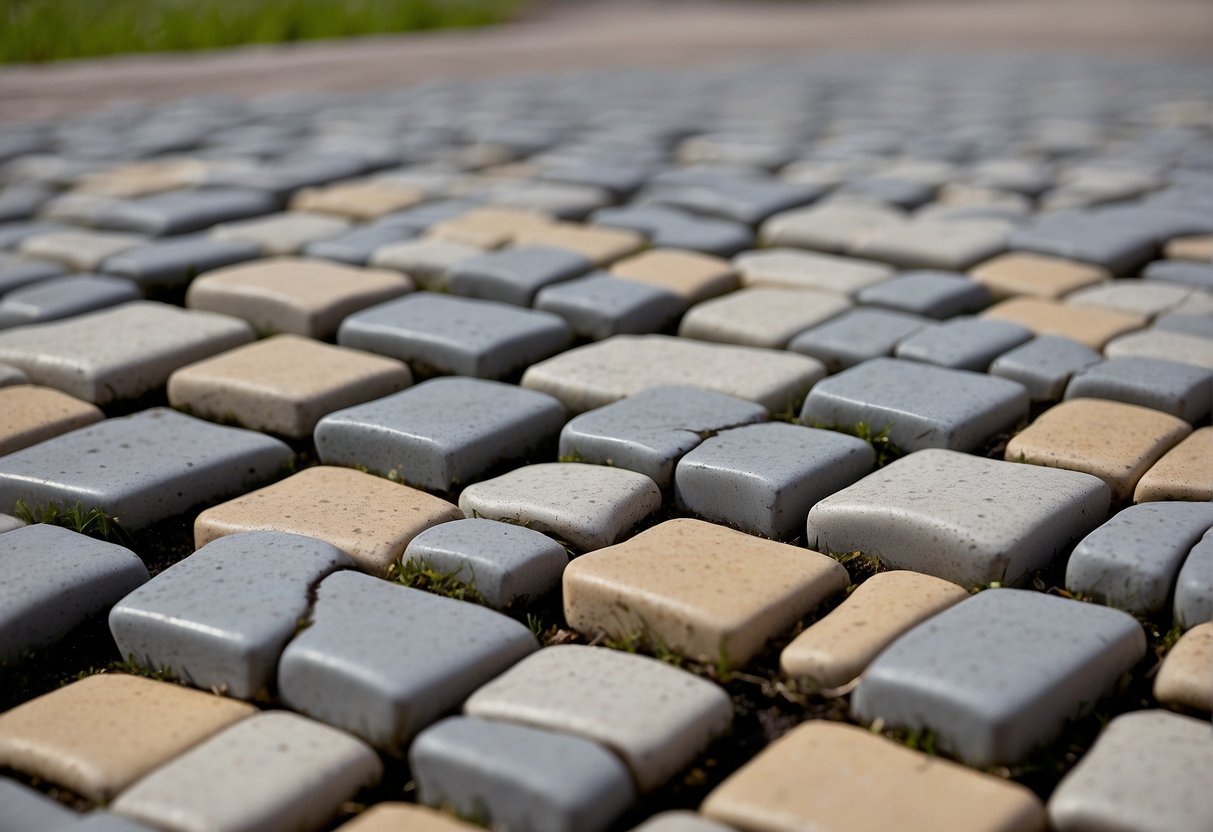
Permeable pavers offer a suite of advantages for urban areas like Fort Myers, from mitigating flood risk to reinforcing environmental stewardship. We find these systems to be particularly adept at handling a range of water-related issues.
Enhanced Drainage Capabilities
Permeable pavers excel at water infiltration, allowing rainwater to pass through joints or porous materials directly into the ground. This feature combats challenges posed by impervious surfaces, where water cannot seep into the ground, often leading to puddles and standing water. By installing permeable pavers, we effectively increase groundwater recharge and prevent the scourge of flooded streets and sidewalks that plague urban landscapes.
Reduction in Runoff and Flooding
The design of permeable pavers strategically reduces stormwater runoff that otherwise flows into drains, natural water bodies, and even overburdens sewer systems. This naturally limits the risk and severity of flooding, a matter of utmost importance in areas prone to heavy rains and storms. Our use of permeable pavers in Fort Myers has seen a significant decrease in the volume of unmanaged stormwater, safeguarding the community against flood damage.
- Stormwater management: Reduction in volume and rate of runoff
- Flooding prevention: Less overflow during heavy rain events
Environmental Advantages
Permeable pavers serve as an eco-friendly solution, contributing to the reduction of water pollution by filtering out contaminants as water percolates through the substrate layers. This process enhances water quality before it reintegrates with natural water systems. Moreover, we embrace the aesthetic appeal of permeable pavers which can be fashioned to mimic natural landscapes, thus maintaining the charm of Fort Myers while bolstering its environmental benefits. They stand as a testament to our commitment to sustainable development and environmental responsibility.
- Water quality: Natural filtration leading to fewer pollutants
- Aesthetic and ecological integration: Maintain natural landscape aesthetics while improving environmental health
Applications in Fort Myers
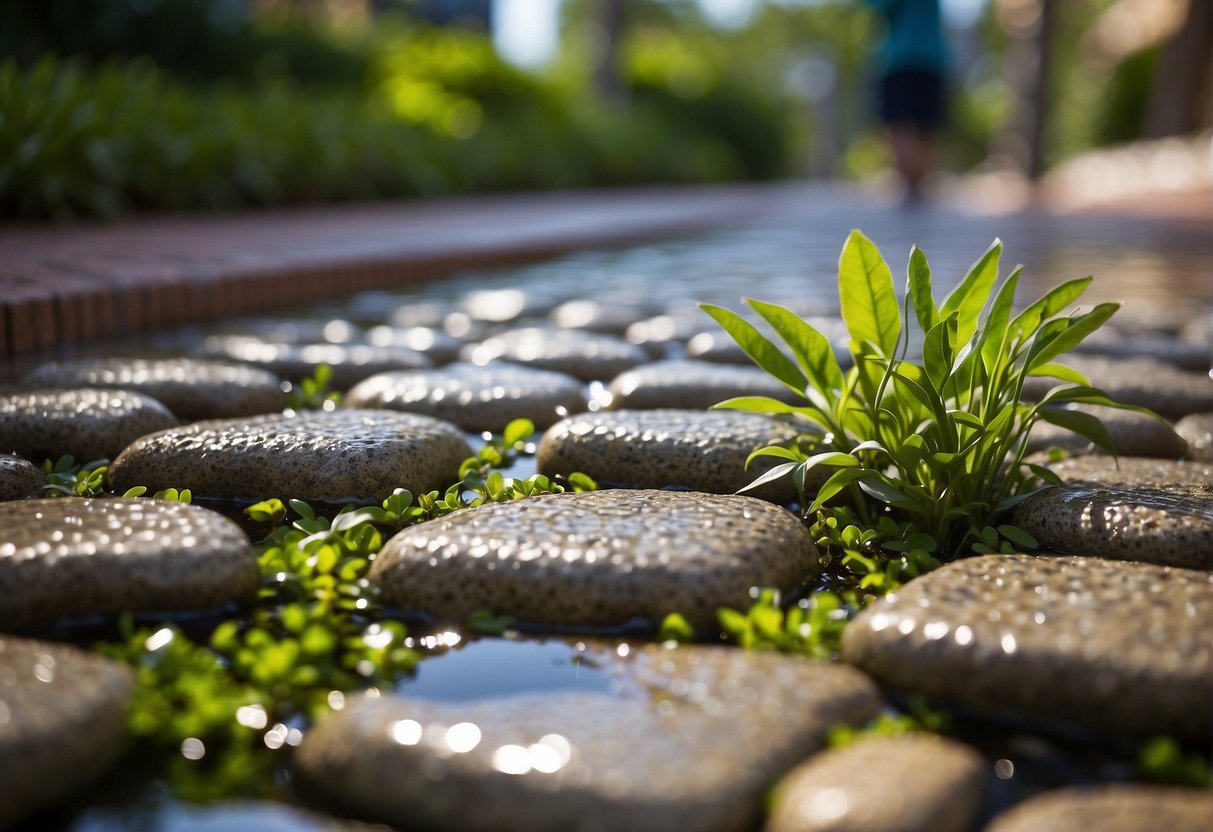
In Fort Myers, we’re observing a growing trend in using permeable pavers to enhance surface water management for both residential and commercial projects. These pavers offer an environmentally friendly solution by reducing runoff and replenishing local aquifers.
Residential Uses
For homeowners in Southwest Florida, permeable pavers have become a popular choice for driveways, patios, and walkways. Their ability to reduce water pooling and prevent erosion is particularly valuable during our rainy season. Additionally, the aesthetic appeal of driveway pavers can dramatically improve the curb appeal of a residential property. Below is a brief outlook on their residential applications:
- Driveways: Provide efficient water drainage while enhancing the visual aspect of the property.
- Patios: Allow rainwater to filter through, preventing stagnant water and contributing to a sustainable outdoor space.
- Walkways: Offer safe, dry paths that connect different areas of the yard, reducing slip hazards.
Commercial Utilization
Within the commercial sector, permeable pavers are instrumental in managing water runoff in various outdoor spaces. Commercial properties, including office parks, retail centers, and public spaces in Fort Myers, are adopting these pavers to address drainage while maintaining an attractive landscape. Here’s how they’re commonly deployed:
- Parking Lots: A durable solution that handles heavy traffic and aids in water management.
- Landscaping Features: Used around trees and garden areas to support natural water absorption and growth.
- Pedestrian Areas: Maintain clear, dry paths that enhance the safety and comfort of visitors even during wet conditions.
Installation and Maintenance
When installing permeable pavers in Fort Myers, it’s essential that the process is done efficiently to guarantee optimal drainage. We should not overlook regular maintenance to sustain their effectiveness over time.
Proper Installation Techniques
We begin by preparing the base, which includes excavating the area and laying down a layer of crushed stone. It is crucial to ensure that the base layer is level and well-compacted for proper support. During installation, we maintain a consistent gap between pavers to facilitate water infiltration.
Steps for Base Preparation:
- Mark the area for paver installation.
- Excavate soil up to the required depth.
- Lay down geotextile fabric to stabilize soil.
- Add and compact a crushed stone base layer.
Furthermore, we consider the local climate and soil conditions when choosing materials, which helps in selecting the appropriate type of permeable pavers. The sand used for filling joints between pavers should also be permeable to avoid clogging the system.
Regular Maintenance Routines
To maintain our permeable pavers, we perform regular inspections and cleaning to prevent debris buildup that can affect permeability. It’s advisable to schedule maintenance services after heavy rainstorms, which can push silt and fine particles into the paver’s joints.
Maintenance Checklist:
- Quarterly: Inspect for weed growth and remove any vegetation.
- Biannually: Check and clear the surface of accumulated debris.
- As Needed: Replace joint filling material to ensure continued permeability.
If specialized maintenance is required, we recommend contacting local pros through a contact form available on service provider’s websites. In our experience, it’s advantageous to establish a relationship with local designers or service providers who understand the region’s specific needs and can offer tailored maintenance plans.
We encourage homeowners to reach out to us directly for advice on regular maintenance or to assist in coordinating these services.
Design and Aesthetics
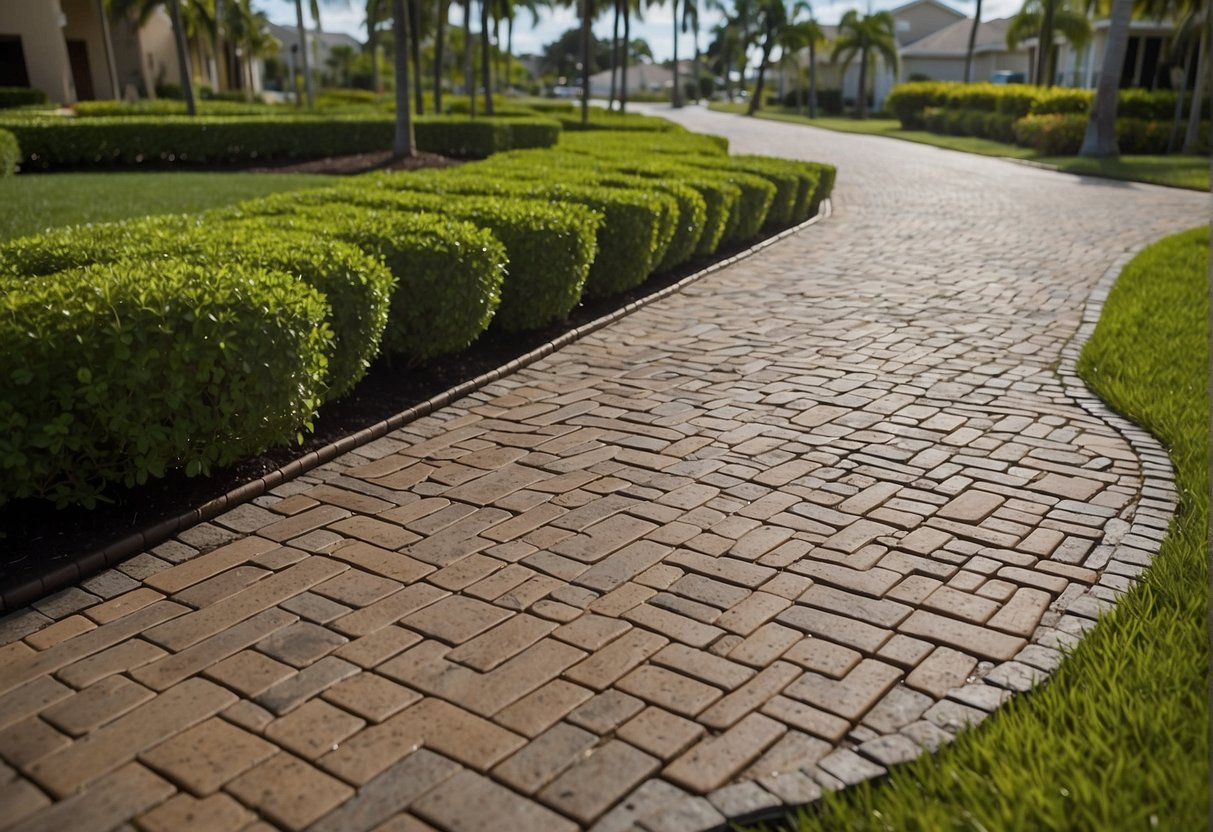
Permeable pavers in Fort Myers not only enhance drainage efficiency but are also pivotal in creating visually appealing surfaces that harmonize with the surrounding landscape. Our focus is on crafting designs that offer both functional and aesthetic value.
Visual Appeal and Design Options
Permeable pavers come in an array of colors and shapes, allowing for a multitude of design patterns. The choices range from vibrant hues to more subdued earth tones, all of which can be arranged in distinct layouts to complement any architectural style.
Options include:
- Colors: Ranging from warm reds to deep grays
- Shapes: Including squares, rectangles, and hexagons
- Patterns: Such as herringbone, basket-weave, and staggered arrangements
By selecting the right combination, we ensure the pavement is not only practical but also boasts a strong aesthetic appeal.
Integrating with Landscaping
Incorporating permeable pavers into the landscaping is a seamless process. We leverage the natural beauty of Fort Myers to enhance the visual appeal of our installations. Strategically placed, these pavers can create attractive pathways that encourage rainwater to infiltrate and nourish adjacent greenery. Our integration techniques often involve:
- Aligning pavers with the natural contours of the land
- Choosing colors that complement the local floral and fauna
- Using contrasting paver shades to highlight garden borders or focal points
Through these methods, we craft outdoor spaces that are not only beautiful but also ecologically sound.
Practical Considerations
In choosing permeable pavers, we assess their durability and cost-effectiveness, while ensuring safety and aesthetics meet the needs of Fort Myers’ residents.
Durability and Longevity
Permeable pavers are known for their long-lasting nature due to a design focused on withstanding various weather conditions. We consider materials that are resilient to the Florida climate, where heavy rain and intense heat are common. Maintenance is minimal and contributes to their durability, as they allow water to pass through, reducing wear from erosion.
Cost Analysis and Budgeting
While upfront costs can be higher than traditional paving options, permeable pavers prove to be cost-effective over time due to lower maintenance costs. Here’s a simplified cost analysis:
- Initial Installation: Higher due to specialized materials and construction techniques
- Long-Term Maintenance: Lower due to durability and self-draining features
- Potential Savings: Reduced stormwater management costs and potential for rebates
Safety and Accessibility
Permeable pavers enhance safety by reducing the chances of slippery surfaces during wet conditions. Their textured surface improves grip and can be designed to be aesthetically pleasing while providing safe, accessible pathways for pedestrians, including those with disabilities.
Environmental Impact and Sustainability
As we explore permeable pavers in Fort Myers, we acknowledge their significant environmental impact and sustainability benefits. These innovative paving solutions contribute positively to ecosystems and encourage sustainable practices by allowing water to filter through and reduce runoff.
Impact on Ecosystem and Biodiversity
Permeable pavers promote a healthy ecosystem balance by allowing rainwater to penetrate the ground naturally, thereby supporting native plant growth and biodiversity. Filtration is a key feature, with the pavers trapping pollutants and chemicals from the runoff, thus protecting our natural water sources. This method of water management not only sustains but also enhances the local flora and fauna.
- Advantages for Biodiversity:
- Supports a diverse range of plant and insect species.
- Maintains natural groundwater levels.
Contribution to Sustainable Practices
Our commitment to sustainability is evident in the adoption of permeable pavers, as they are an environmentally friendly solution that addresses urban runoff issues. By facilitating the natural filtration process, these pavers reduce the presence of debris and pollutants. They are a testament to eco-friendly engineering, offering a long-term, sustainable alternative to traditional paving.
- Sustainable Features:
- Reduces the need for costly drainage infrastructure.
- Made from recycled and sustainable materials.
In Fort Myers, the integration of permeable pavers demonstrates our dedication to environmental benefits and the promotion of nature-centered urban development.
Potential Challenges and Solutions
In adopting permeable pavers within Fort Myers, we’re tasked with addressing common concerns and overcoming installation obstacles. We prioritize enhancing drainage and mitigating flooding, while being mindful of our unique climate and environmental conditions.
Addressing Common Concerns
Weather Resistance: In our region, erosion due to heavy rains and the possibility of ice during colder months are potential concerns. To tackle these issues, permeable pavers are designed to allow rainwater to filter through, reducing the formation of puddles and relieving pressure on storm drains.
- Pros: They allow water to penetrate, mitigating run-off and decreasing erosion.
- Cons: Ice may form in the voids between pavers in freezing temperatures.
Pollutant Filtration: Permeable pavers also assist in trapping and breaking down pollutants like oil from vehicles which could otherwise contaminate our water systems.
- Pros: This method helps in keeping our environment cleaner.
- Cons: Regular maintenance is necessary to ensure the filtration process remains effective.
Overcoming Installation Obstacles
Soil Suitability: We must ensure compatibility between the soil in Fort Myers and the selected permeable pavers to prevent sinking and misalignment over time.
- Strategy: Conduct soil tests prior to installation to identify and address any potential issues.
Technical Expertise: The installation of permeable pavers requires a level of technical know-how to ensure effective drainage and durability.
- Solution: We recommend hiring experienced professionals who specialize in permeable paving systems.
Advanced Topics
In this section, we’ll explore cutting-edge developments in permeable paving solutions and how they align with local regulations in Fort Myers to enhance drainage and environmental sustainability.
Innovation in Paver Technology
Permeable pavers have evolved significantly to improve function and performance. Advances in porous concrete technology have increased its efficacy in managing water runoff on streets and areas with high foot traffic. We now have pavers with integrated lighting systems, which not only illuminate pathways for safety but also contribute to the aesthetic appeal of the urban landscape.
- Material Innovations:
- High-strength, less porous materials for increased durability.
- Lightweight aggregates for better water permeability.
- Design Improvements:
- Interlocking shapes for easy installation and stability.
- Enhanced porosity to handle heavier rainfalls efficiently.
Local Regulations and Compliance
Fort Myers has specific requisites for construction materials and urban infrastructure to ensure they meet environmental and safety standards. Our permeable paving solutions are tailored to comply with these regulations, focusing on functionality and performance while contributing to the city’s water management systems.
- Compliance Points:
- Porosity standards to support groundwater recharge.
- Load-bearing criteria to ensure safety on streets and walkways.
- Regulatory Guidelines:
- Installation procedures that align with Fort Myers’ sustainable urban planning.
- Periodic maintenance schedules to retain permeability and prevent blockages.
Selecting a Service Provider
When considering permeable pavers for enhanced drainage in Fort Myers, it’s crucial to select the right service provider. We’ll focus on finding qualified professionals and evaluating their service and support to ensure a successful project.
Finding Qualified Professionals
First, when searching for a professional to install permeable pavers, we must ensure they possess the necessary credentials and experience. Use the following checklist to guide your search:
- Check Certifications: Verify that the professionals are certified by relevant local or national bodies.
- Experience Matters: Look for service providers with proven experience in installing permeable pavers in Fort Myers.
- Referrals: Ask for a portfolio of past work and referrals from previous clients.
A contact form on the service provider’s website can provide us with a quick way to obtain additional information about their qualifications.
Evaluating Service and Support
Next, let’s evaluate the level of service and support provided by the local pros:
- Availability: Pros with the ability to respond swiftly to our inquiries signal reliable customer service.
- Clarity of Communication: We must expect detailed explanations of their installation process and maintenance guidance.
- Support: After-service support is essential. Ensure they offer clear guidelines on how to manage and maintain permeable pavers.
- Warranty: A solid warranty can provide us with peace of mind about the quality of the workmanship.
Evaluating these factors carefully will lead us to a credible service provider that meets the specific drainage needs of our Fort Myers property.
Enhancing Fort Myers
Fort Myers is transforming its urban landscape with a focus on improving drainage and adding aesthetic value through permeable pavers.
Improving Local Drainage Infrastructure
Fort Myers, situated in Southwest Florida, frequently battles with stormwater runoff, especially during the rainy season. By incorporating permeable pavers in our urban planning, we enable the ground to absorb more water, reducing the burden on traditional drainage systems. Roads, sidewalks, and public spaces are being targeted for these upgrades. These permeable solutions facilitate the natural filtering of rainwater, thereby improving the quality of water entering our aquifers.
- Key Benefits
- Reduced flooding: Less surface water accumulates during heavy rainfall.
- Sustainable water management: Enhances the recharge rate of groundwater.
Boosting Aesthetic and Functional Value
Apart from their functionality, permeable pavers also contribute to the visual appeal of Fort Myers. A bonus for any city, especially one with a tourism sector as vibrant as ours, is an increase in aesthetic appeal. The design options available with permeable pavers allow for creative patterns and a variety of colors, boosting the beauty of our streets and aligning with Tampa’s commitment to visually pleasing urban environments.
- Enhanced Aesthetics:
- Visual consistency: Creates a cohesive look throughout the city.
- Design versatility: Offers a range of styles to suit different areas of Fort Myers.
Case Studies and Examples
In Fort Myers, we’ve witnessed significant improvements in drainage systems through the successful application of permeable pavers in various settings. Our exploration covers both residential and commercial projects that have benefitted from these installations.
Successful Residential Projects
We’ve observed numerous residences upgrade their drainage capabilities with permeable paver driveways and patios. One specific example is the Smith residence, which installed a permeable paver patio. Post-installation, the Smiths have reported no standing water during Florida’s heavy rain season, a testament to the system’s effectiveness.
- Project: Smith Residence
- Installation: Permeable Paver Patio
- Outcome: Enhanced drainage; no standing water
Similarly, the Jones family transformed their walkway with permeable pavers, leading to:
- Project: Jones Family Walkway
- Installation: Permeable Paver Walkway
- Outcome: Reduced runoff; improved water management
Commercial Property Transformations
Commercial properties in Fort Myers have also embraced permeable pavers to tackle drainage issues. The Riverfront Office Park replaced their traditional concrete lots with permeable pavers, which has alleviated their previous flooding problems during downpours.
- Project: Riverfront Office Park
- Installation: Permeable Paver Driveway and Parking Spaces
- Outcome: Eliminated flooding; sustainable water management
Furthermore, the Green Terrace Shopping Center introduced permeable pavers in its patios and has seen a drastic decrease in the need for manual drainage and maintenance.
- Project: Green Terrace Shopping Center
- Installation: Permeable Paver Patios
- Outcome: Lower maintenance costs; enhanced aesthetics and functionality
Why Choose Permeable Pavers
Permeable pavers offer a sustainable solution for effective stormwater management and an array of other benefits in urban landscapes like Fort Myers.
Summarizing the Advantages
Environmental Benefits: Our permeable pavers allow rainwater to seep through their surfaces, replenishing groundwater supplies and reducing stormwater runoff. This process filters out pollutants, thereby improving water quality and contributing to the environmental sustainability of Fort Myers.
Durability and Maintenance: We find that these pavers are remarkably durable and require minimal maintenance over time. They resist cracking and heaving better than traditional pavement because water can pass through them rather than collect on their surface.
Aesthetic Appeal: There’s a high aesthetic value to permeable pavers. They come in various shapes, colors, and textures that enhance the visual appeal of our parking lots, driveways, and walkways. Their design versatility can complement any architectural style.
Long-lasting: The long lifespan of permeable pavers is an investment in our city’s infrastructure. Their ability to withstand heavy loads and high traffic makes them an ideal choice for both residential and commercial applications in Fort Myers.
Cost-Effectiveness: Initially, permeable pavers might have a higher upfront cost, but we recognize the savings over time due to reduced maintenance costs and the longevity they offer. They also may contribute to reduced municipal stormwater management costs.
By choosing permeable pavers, we’re not only enhancing drainage but also investing in an environmentally friendly, durable, cost-effective, and aesthetically pleasing solution for our urban landscapes.
Contact and Next Steps
When considering permeable pavers for improved drainage in Fort Myers, we provide a streamlined approach to ensure that your needs are addressed. Below you’ll find a clear guide to beginning your journey with permeable pavers and how to reach out to our team for a tailor-made solution.
Getting Started with Permeable Pavers
To embark on upgrading your outdoor space with permeable pavers, it is essential to understand the scope and benefits of such an investment. Our local pros are well-equipped to:
- Assessment: Provide a comprehensive assessment of your area’s specific needs.
- Options: Discuss the various permeable paver options, including materials and design patterns.
Initiating Your Project Inquiry
Embarking on your permeable paver project is straightforward:
- Contact Form:
- Visit our website and complete the contact form.
- Ensure to detail the scope of your project for a more accurate consultation.
- Local Pros Consultation:
- Upon submission, our team will promptly review your inquiry.
- We will connect you with local professionals in Fort Myers who have a proven track record.
By following these steps, we ensure that your project gets the attention and expertise it deserves.
Material Options and Varieties
In Fort Myers, a diverse range of materials is available for permeable pavers, each offering unique benefits regarding durability and aesthetics. We will discuss the characteristics of different materials to guide your selection process.
Exploring Different Paver Materials
- Concrete: This versatile and strong material is commonly used for permeable pavers. Concrete pavers are often designed with spaces between them to allow water to pass through. They are available in various shapes and finishes to suit different architectural styles.
- Stone: Natural stone pavers, including limestone, granite, and slate, provide an organic look. They are highly durable and can handle heavy traffic, although their cost might be higher compared to other materials.
- Brick: As a traditional choice, brick pavers offer a classic aesthetic. Made from kiln-fired clay, they can last for decades. Brick pavers are also available in a range of earthy colors, adding to their natural appeal.
- Plastic: Plastic grid systems can be filled with soil and grass or gravel, making them an eco-friendly option. They are lightweight and easy to install, though they may not be as sturdy as stone or concrete.
- Gravel: Loose gravel can serve as a simple, inexpensive permeable paving material. It is easy to maintain and replenish, yet it may require edging to keep in place.
- Crushed Stone: Similar to gravel, crushed stone is a cost-effective option and comes in various sizes and colors. It allows for excellent water permeation but, like gravel, may need edging to maintain its form.
Technical Specifications
In our pursuit of enhanced drainage solutions for Fort Myers, we carefully examine the load-bearing capacities of permeable pavers to ensure their durability and performance meet the necessary standards.
Understanding Load-Bearing Capacities
Permeable pavers are designed to withstand specific weight loads, and their capacities are critical to their function and long-term durability. Firstly, the load-bearing capacity refers to the maximum weight that the pavers can support over their lifespan without becoming structurally compromised.
- Axial Load Capacity: Each paver type is tested for axial load capacity, typically measured in pounds per square inch (psi).
- Standard concrete permeable pavers: Ranges from 8,000 to 10,000 psi
- Plastic grid pavers: Can vary widely, some products withstand up to 12,000 psi
- Dynamic Load Support: This measure is crucial for driveways or streets where vehicles are in constant motion. It assesses how well pavers handle loads in motion, which is different from static loads.
When assessing pavers for specific projects, we ensure they comply with the ASTM D7000 standard for load-bearing capacity. This standard assures us that the pavers will perform reliably under expected traffic conditions while contributing to surface water management through their permeable nature.
Our selection process involves strict scrutiny to match the technical specifications with the project requirements, ensuring resilience in the face of heavy rains and frequent usage. By selecting the appropriate pavers with suitable load-bearing capacities, we guarantee functional and durable pavement systems that stand the test of time.
Frequently Asked Questions
Permeable pavers provide effective drainage solutions for Fort Myers, addressing environmental and infrastructural concerns with innovation and efficiency.
What are the advantages of using permeable pavers for drainage?
Permeable pavers allow water to pass through their surface, reducing runoff and replenishing groundwater. This helps mitigate the risk of flooding and erosion by naturally filtering water back into the earth. Their open-graded base also acts as a natural filter, improving the quality of water that percolates into the soil.
How do permeable pavers compare to traditional pavers in terms of cost and installation?
Initially, permeable pavers can be more expensive than traditional ones due to the specialized materials required for their porous nature. However, they can potentially lead to cost savings over time because of reduced stormwater management needs and potential for rebates or incentives from local governments for their ecological benefits. Installation is similar to traditional pavers, but with an additional focus on the substrate and base layers to ensure proper drainage.
Can permeable pavers help to address flooding concerns?
Permeable pavers are specifically designed to alleviate flooding. By allowing water to seep through, they reduce surface water accumulation, which can overwhelm drainage systems during heavy rainfall. When implemented effectively, these systems can significantly reduce the burden on storm drains and decrease the risk of flood damage.
What maintenance is required for permeable paver systems?
We recommend regular maintenance, including vacuum sweeping and occasional pressure washing, to remove debris that could clog the pores in the pavers. It’s important to keep the joints between the pavers filled with the appropriate aggregate to ensure continued permeability and to prevent weeds or ant infestation.
How do local climate conditions affect the choice of permeable pavers?
The selection of permeable pavers in Fort Myers should take into account the local subtropical climate, which includes frequent rainfall and high humidity. Pavers should be chosen based on their ability to withstand the volume of rain and potential for heat expansion. Materials that can maintain permeability in these conditions are essential for long-term functionality.
What are the environmental benefits of installing permeable pavers?
By enhancing groundwater recharge and reducing stormwater runoff, permeable pavers contribute to the reduction of pollutants in our waterways. They also help in lowering heat island effects due to their ability to absorb and retain less heat than traditional paving materials, leading to cooler surrounding areas. The installation of permeable pavers thus supports a more sustainable and ecologically conscious approach to landscaping and urban development.
